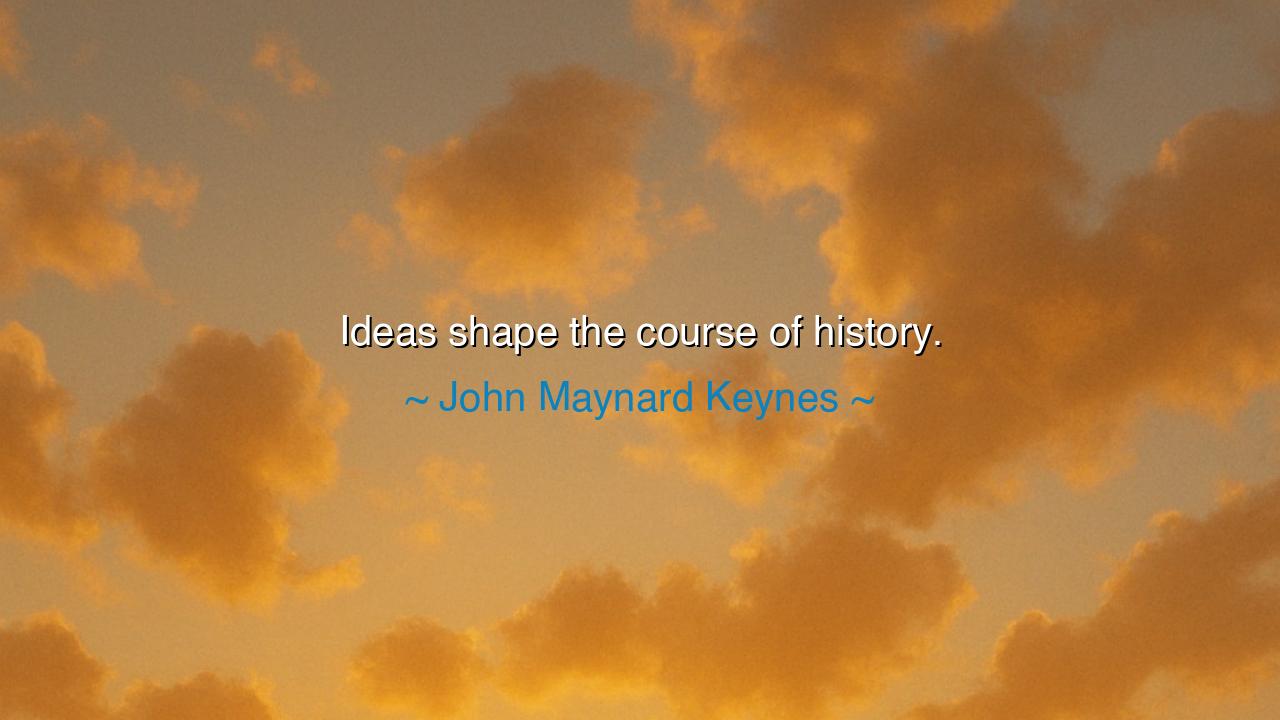
Ideas shape the course of history.






“Ideas shape the course of history.” — Thus declared John Maynard Keynes, the great thinker whose mind reshaped the modern world’s understanding of economy and power. His words carry the quiet thunder of truth, for they remind us that the greatest forces in human destiny are not armies or empires, but ideas — those invisible sparks born in the depths of the mind, which outlast kingdoms, outlive tyrants, and outshine the monuments of stone. Every age is moved not first by the sword, but by the thought that guides the hand that wields it.
To say that ideas shape history is to say that thought precedes action, and vision precedes reality. Behind every revolution, every discovery, every movement that transforms the world, there stands an idea — fragile at first, like a whisper in the dark, yet powerful enough to bend the course of nations. The human mind, though housed in mortal flesh, is capable of birthing the immortal. From the depths of solitude, a single thinker can alter the fate of millions. So it was with Keynes himself, whose theories during the Great Depression gave new hope to broken economies. He understood that wealth and poverty are not only conditions of matter, but consequences of belief — that if people change their ideas about how the world works, the world itself will begin to change.
Consider the story of Galileo Galilei, who lifted his eyes to the heavens and dared to proclaim that the Earth was not the center of the universe. His idea defied kings and priests, shaking the foundations of faith and power. He suffered exile and silence for his truth, yet his vision endured. Centuries later, his thought became the cornerstone of modern science. Galileo had no armies, no empire, no wealth — only an idea. And yet, that idea reshaped the heavens and the minds of men forever. Thus, Keynes’s wisdom is confirmed: it is not the might of men, but the light of thought that turns the wheel of history.
Throughout the ages, ideas have been both creators and destroyers. The idea of democracy toppled monarchies; the idea of tyranny chained nations. The idea of equality gave rise to revolutions, while the idea of superiority plunged humanity into war. Ideas can heal or harm, depending on the heart that holds them. For this reason, the ancients revered the philosopher as both dangerous and divine — dangerous, because his thoughts could unsettle the world; divine, because in them lay the possibility of enlightenment. A single word, spoken at the right time, can awaken a sleeping people. A single vision, misunderstood, can set the world aflame.
Keynes spoke these words as one who had witnessed such power firsthand. He lived through wars and economic collapse, through despair and rebirth. He saw how the world was governed not only by material forces, but by the beliefs men hold about those forces. When fear ruled minds, markets crumbled. When hope returned, nations rebuilt. Thus, he taught that the true engine of progress is not machinery or money, but imagination and conviction. The invisible architecture of ideas — the way people think about work, value, justice, and life — determines the destiny of civilizations.
There is a deeper lesson still. When Keynes said that ideas shape history, he was not speaking only of great philosophers or statesmen, but of all who dare to think differently. Every change begins with a thought — and every thought has the potential to move the world. The abolition of slavery, the discovery of flight, the dream of human rights — all began in the quiet of the mind, long before they became the roar of history. Thus, to think deeply, to question boldly, to imagine fearlessly — these are not idle acts; they are sacred duties to the human spirit.
Let this be your lesson: guard your ideas, for they are seeds of destiny. What you believe about yourself, about others, about the world — these beliefs shape your life and, through you, shape history itself. Do not let ignorance or fear dictate your thought; let truth, compassion, and courage guide it. For every person who dares to think with integrity adds a new light to the eternal flame of civilization.
And so, remember this teaching: swords will rust, cities will crumble, and empires will fade, but ideas endure. They are the true architects of time, the unseen hands that shape the rise and fall of nations. Feed your mind with wisdom, and your life will become a force that moves the ages. For as John Maynard Keynes declared, and as the story of all humankind affirms — it is ideas, not power, that shape the course of history.






AAdministratorAdministrator
Welcome, honored guests. Please leave a comment, we will respond soon